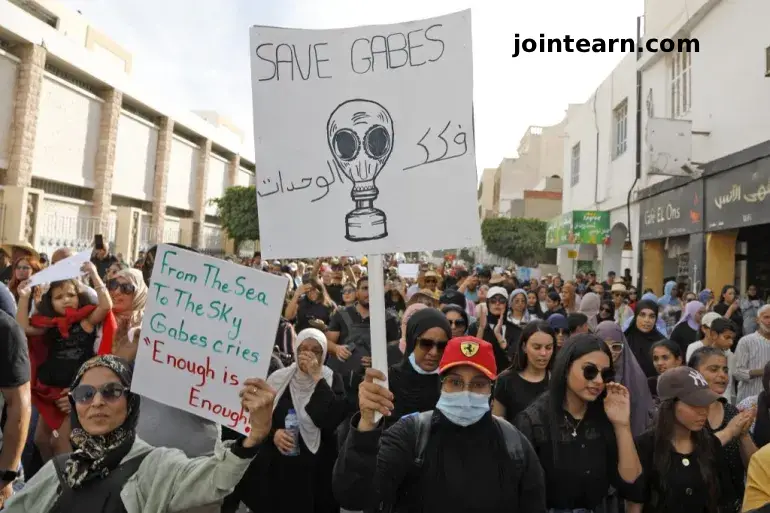
A massive general strike has paralyzed the southern Tunisian city of Gabes, as tens of thousands of residents joined protests demanding urgent action against toxic pollution caused by a state-run chemical and phosphate plant. The strike, called by Tunisia’s powerful UGTT labor union, brought the city to a halt on Tuesday — with shops, schools, markets, and government offices closed in solidarity with environmental and social demands.
Citywide Shutdown Amid Environmental Anger
Gabes, a coastal city of about 400,000 residents, has long suffered from the side effects of industrial pollution. The CGT phosphate chemical complex, established in 1972, has been accused by residents and activists of releasing toxic waste, phosphogypsum, and gas emissions into the sea and air — causing widespread health issues and environmental degradation.
“Everything is closed in Gabes,” said Saoussen Nouisser, the local UGTT representative. “We’re all angry at the catastrophic environmental situation in our marginalized city.”
Protesters filled the streets carrying banners reading “Gabes wants to live” and “Dismantle the polluting units.” They chanted slogans condemning government inaction and demanding justice for victims of respiratory illnesses, cancer, and marine pollution.
Public Health Emergency Declared
Local hospitals have reported a surge in respiratory illnesses, with over 200 people hospitalized in recent weeks due to gas exposure and air contamination. NGOs and medical professionals have warned of a potential public health disaster, as toxic emissions from the plant continue to spread through surrounding neighborhoods.
Environmental activist Safouan Kbibieh said the pollution crisis had “poisoned everything — the trees, the sea, and the people.” He added, “Even Gabes’s famous pomegranates now taste like smoke.”
Political Pressure on President Kais Saied
The environmental unrest poses a major political test for President Kais Saied, whose government faces growing criticism for failing to deliver on promises of environmental justice. Saied described the crisis as an “environmental assassination”, blaming decades of mismanagement by previous administrations for destroying marine ecosystems and public health.
Despite government promises in 2017 to relocate or close the plant, authorities have increased production in recent years, citing phosphate as a pillar of Tunisia’s struggling economy. The move has further enraged locals who accuse the government of prioritizing profits over human lives.
UGTT Vows to Escalate Protests
Sami Al-Tahiri, secretary-general of the UGTT, told reporters that the strike had succeeded “across all segments of the population.” He praised the unity of the people of Gabes and warned that the union was ready to “escalate with further protests and mass rallies” if authorities fail to meet environmental demands.
“Tunisians are prepared to struggle for their legitimate rights,” Al-Tahiri said, emphasizing that environmental justice is tied to social and economic dignity.
A Decades-Old Crisis Deepens
The Gabes chemical plant, which produces fertilizers and other phosphate-based products, has long been at the center of Tunisia’s environmental debate. Environmental experts have linked the plant to cancer clusters, collapsing marine biodiversity, and soil contamination across the Gulf of Gabes — once one of North Africa’s richest fishing zones.
Despite multiple studies confirming the harmful effects of phosphogypsum waste, government oversight remains weak, and pollution continues unchecked. The plant’s open-air waste ponds emit radioactive dust, while chemical effluents are routinely discharged into the Mediterranean Sea.
Authorities recently announced “urgent containment measures” and collaboration with Chinese companies to help reduce emissions and modernize the facility. However, activists have dismissed these promises as “too little, too late.”
Public Outcry and Global Solidarity
Environmental groups across Tunisia and the broader Maghreb region have expressed solidarity with Gabes residents, calling for an independent investigation and international environmental monitoring. Social media campaigns under hashtags like #SaveGabes and #GabesWantsToLive have trended globally, highlighting the crisis as a symbol of environmental neglect and government corruption.
“This is not just about Gabes,” said Kbibieh. “It’s about the right of every Tunisian to breathe clean air, to live without fear of being poisoned in their own home.”
Outlook: Gabes as Tunisia’s Environmental Battleground
The Gabes strike has transformed into a nationwide environmental movement, pressuring authorities to implement real reforms in industrial regulation, waste management, and public health protection.
Analysts say that if the government fails to act decisively, Gabes could become a focal point for broader social unrest in Tunisia — a country still grappling with economic crisis, youth unemployment, and political polarization.
For now, the people of Gabes continue their peaceful protests, determined to reclaim their city from decades of pollution and neglect.
“We are fighting for life,” one protester said. “And we will not stop until Gabes breathes again.”


Leave a Reply